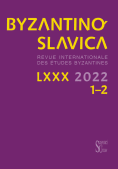Kinship, Orthodoxy and Political Ideology: The Byzantines and the Balkans after the Catastrophe of 1204
Kinship, Orthodoxy and Political Ideology: The Byzantines and the Balkans after the Catastrophe of 1204
Author(s): Vlada StankovićSubject(s): Politics / Political Sciences, Christian Theology and Religion, Politics, History, Middle Ages, Theology and Religion, 13th to 14th Centuries, Eastern Orthodoxy, Politics and Identity
Published by: AV ČR - Akademie věd České republiky - Slovanský ústav and Euroslavica
Keywords: Byzantine political identity ;core identity marker ;rare innovative attempts ;wider orthodox world ;Constantinople ;Byzantine commonwealth ;Byzantine empire ;Dimitri Obolensky;
Summary/Abstract: The concept of the Byzantine Commonwealth, conceived by Dimitri Obolensky more than half a century ago, remains one of the rare innovative attempts to study the relations of Byzantine Empire with the wider Orthodox world that leaned toward Constantinople. However, Obolensky paid little attention to the idea of Romanness as the core identity marker of the Byzantines, focusing mainly on the second element of the Byzantine political identity, especially after the fall of Constantinople in 1204: Orthodoxy and its bonding potential. The present paper offers a new perspective by arguing that the bases of the gradually strengthening bonds between the Byzantine states, both the empire of Nicaea and the state of Epirus, with the Bulgarians and the Serbs, are to be found in the system of kinship networks established both within the now destroyed Byzantine empire, and beyond its borders, from the beginning of the twelfth century onwards.
Journal: Byzantinoslavica - Revue internationale des Etudes Byzantines
- Issue Year: LXXX/2022
- Issue No: 1-2
- Page Range: 108-119
- Page Count: 12
- Language: English
- Content File-PDF

